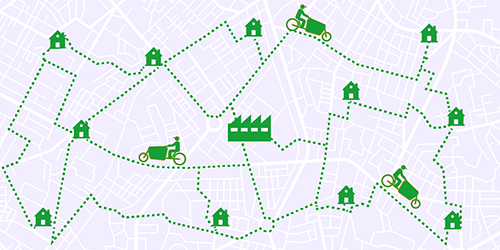Client
Deliquik was a quick-commerce project that planned the rapid delivery of groceries using cargo e-bikes in urban areas. The project could not be realized due to changing market conditions.
Initial situation
To maximize efficiency, Deliquik intended to develop a cost-effective fulfillment system. Strategic and operational questions arose, including the optimal number and placement of warehouses, staffing requirements to meet delivery times, and the advantage of bundling deliveries and trips. Additionally, it had to be decided whether the couriers should deliver exclusively or also pick goods.
Solution
An agent-based simulation model was developed in which customers, couriers, and pickers are represented as agents. With random customer orders and the dynamic solving of the Traveling Salesman Problem, the optimal bundling of orders and the best routes could be determined based on simulation experiments. The model was programmed in Python.
Result
With the model, Deliquik was able to gain an improved understanding of the fulfillment system and its dependencies. It enabled the determination of the optimal number and locations of warehouses, as well as the calculation of staffing requirements depending on the expected number of orders per hour. By bundling the orders to be delivered, personnel costs could be reduced by 20 to 30%.


